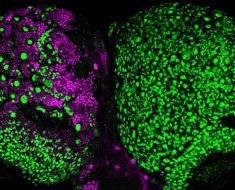Large doses of a sperm protein that is ineffective in infertile males can be injected directly into eggs to kick-start fertilization, giving couples hope of conceiving.
A sperm protein, called phospholipase C zeta (PLCζ), has been found to be necessary for egg fertilization. The protein is ineffective in some infertile men, according to new research by collaborators from Qatar University and Cardiff University in the UK.
The team was able to initiate the fertilization process in the lab by injecting eggs with a higher amount of the PLCζ protein than naturally found in the sperm of infertile men. The results suggest that this type of infertility could become reversible.
“This study discovered that PLCζ protein generated in the lab can successfully replace sperm and trigger the development of an egg up to the blastocyst embryo stage,” says Michail Nomikos of Qatar University’s College of Medicine. “We are currently developing a therapeutic agent to treat such cases of male infertility.”
Sperm PLCζ is an essential trigger of the first ‘egg activation’ stage of fertilization. The egg is in a dormant state until a sperm fuses with it, delivering the PLCζ protein and stimulating the critical egg activation events that lead to early embryo development. This PLCζ ‘spark of life’ protein was discovered in 2002 by Tony Lai and his team at Cardiff University.

Recent clinical studies have reported that the sperm of some males fail to initiate fertilization despite having normal morphology and motility. Even though the sperm can fuse with an egg, nothing follows. Nomikos, Lai and their collaborators discovered that sperm from these men lack a properly functioning version of PLCζ.
The team investigated the effects of a mutation in the gene that codes for PLCζ on infertility. They found that injecting the mutated PLCζ protein into mouse eggs, at levels comparable with those of infertile men, failed to spark the fertilization process. However, if they increased the amount of abnormal protein to higher levels than naturally present, the normal fertilization process began. The researchers suspect that the very high amount of protein somehow compensates for its impaired functioning.
“We hope that this work will lead to a PLCζ therapy to help couples suffering from infertility to have the chance of a family,” says Lai.
Source: Read Full Article





